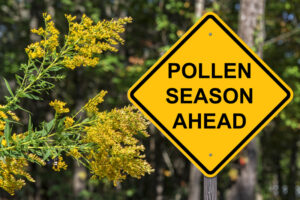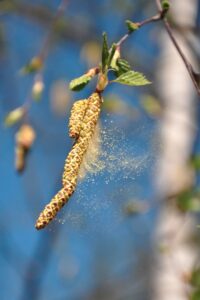The Holistic Approach to Seasonal Allergies
Why You’re Feeling Extra Under the Weather this Season

Sudden nasal congestion, irritated eyes, headaches, itchy throat… all trademark signs of another allergy season, also known as spring.
With the arrival of spring, comes “better” weather and the urge to enjoy the great outdoors. For those who suffer from seasonal allergies, it’s always a Catch-22. The more time you spend outside, the worse you feel.
This year, you may be feeling particularly wrecked by seasonal allergies — or if you’ve never suffered much from them, you might experience new symptoms.
Allergists predict that the 2022 season may be worse than average due to factors such as climate change.
Science is showing that allergy seasons may come earlier and with more intensity. A recent study shared by CNN shows that by the end of the century, annual pollen counts could increase up to 250% due to global warming.
No one wants to experience insufferable allergy symptoms just when the weather is finally getting nice!
Keep reading for a closer look at what to expect this allergy season and discover how we combat seasonal allergies naturally.
What Causes Seasonal Allergies?
Seasonal allergies are triggered by the release of new allergens, which is caused by changing seasons and changing weather. These allergens then trigger a person’s overly sensitive immune system, causing symptoms.
As winter turns to spring, plants begin to blossom and release pollen into the air.
 Grass has some of the highest pollen levels. Trees are a close second. Outdoor molds also begin releasing spores in the spring.
Grass has some of the highest pollen levels. Trees are a close second. Outdoor molds also begin releasing spores in the spring.
Summer brings a peak in outdoor mold, while fall exposes us to indoor triggers such as dust mites and pet dander.
Weather changes trigger allergies by introducing new allergens or higher concentrations. Weather is directly related to allergy conditions. Dry and windy conditions blow pollen and other allergens into the air, causing hay fever, sneezing and a variety of other reactions.
Hot and humid days present moist conditions ripe for mold growth both outside and inside. These conditions also allow dust mites to thrive. Rainy days, however, weigh down pollen and dust, giving those with pollen allergies a reprieve.
Why are Allergies Getting Worse?
It’s not just you.
Allergists and scientists both have noted that allergy risk gets worse year to year. This is due to the growing length and intensity of pollen season, which is tied to climate change.
From Alabama to Wyoming, clouds of pollen and other allergens waft over cities and get stuck in the air for months on end. It is estimated that up to 50 million American experience allergies. As the count of pollen and other allergens increases, so does the number of people who are affected.
Increased pollen and other irritants in the air also affects those with preexisting conditions, such as asthma. Severe asthma attacks induced by pollen are increasing, with the latest number at 20,000 emergency room visits per year.
Symptoms of Seasonal Allergies?
The severity of seasonal allergy symptoms will depend on your body’s individual immune system and the specific allergens that trigger it. Common allergy symptoms include:
- Runny nose
- Watery eyes
- Sneezing
- Coughing
- Itchy eyes and nose
- Dark circles under the eyes
- Hives/rash
- Loss of smell or taste
Quick Tips to Reduce Allergic Reactions
 There are a variety of simple fixes you can implement to help reduce allergic reactions. Start with checking the weather forecast and reading pollen and mold counts in your area. On days with high allergen levels, it’s best to stay inside to prevent symptoms.
There are a variety of simple fixes you can implement to help reduce allergic reactions. Start with checking the weather forecast and reading pollen and mold counts in your area. On days with high allergen levels, it’s best to stay inside to prevent symptoms.
While we can’t do much about the weather, we can control our indoor environments. Purchasing an air filter designed to remove allergens and contaminants can help your house stay allergy-proof. Using a dehumidifier on hot, humid days can also help prevent mold growth and dust mites.
Staying prepared and on top of seasonal allergies is the best thing we can do to limit symptoms. Meeting with your doctor early in the season to create anti-allergy strategies can go a long way in preventing symptoms long term.
Accurately diagnosing and understanding your allergies is also a key part of prevention. Talking with a provider about your symptoms and when they flare up can help figure out what allergen triggers your specific reaction.
The Functional Medicine Approach
 Conventional medicine treats seasonal allergies with prescriptions, which can cause side effects and fail to address the root problem of your symptoms. Functional Medicine will utilize in-depth testing and assessments to address the root cause of your allergies. Without addressing the root cause, allergies have little potential of going away.
Conventional medicine treats seasonal allergies with prescriptions, which can cause side effects and fail to address the root problem of your symptoms. Functional Medicine will utilize in-depth testing and assessments to address the root cause of your allergies. Without addressing the root cause, allergies have little potential of going away.
Pollen and other irritants can cause the immune system to flare up. Allergy symptoms can point to a more serious problem going on at a cellular level and prevent the immune system from responding to crucial health issues.
Dr. Mark Hyman, a leading voice in Functional Medicine, notes that patients often complain about gut issues in relation to their allergic response. Addressing a patient’s nutritional routine can heal the gut and fight off seasonal allergies.
60% of the immune system resides in the gut. When the system is irritated, it reacts to everything. Fixing the gut can directly impact your body’s reaction to seasonal irritants and prevent annoying allergy symptoms from kicking in.
Conscious Diet
 Functional Medicine can help people replace bad with good. Eating whole foods and a high-fiber diet rich in anti-inflammatory plant chemicals can help calm the gut and strengthen the immune system.
Functional Medicine can help people replace bad with good. Eating whole foods and a high-fiber diet rich in anti-inflammatory plant chemicals can help calm the gut and strengthen the immune system.
Eliminating common toxic triggers like wheat, corn, dairy, soy and alcohol can also help protect your immune system from invading irritants. Avoiding sugar and trans-fat and consuming healthy fats instead can also strengthen your diet. Important health fats include extra virgin olive oil, nuts, avocados, and moega-3 fats.
Allergy Healing Nutrients
Using powerful gut-healing nutrients can help your gut and immune system ward off unwanted allergens. Taking a good probiotic is a great place to start as they provide your body with good bacteria to help improve digestion and reduce inflammation.
Other helpful nutrients for the gut include zinc, curcumin, fish oil and glutamine. Finding a high-quality multivitamin is also a good trick to keep your body full of nutrients all year round.
Quercetin and nettles are also good for relieving allergy symptoms, while also having anti-inflammatory and anti-histamine properties.
Acupuncture Against Allergies
 If you are suffering from pesky allergy symptoms, acupuncture can be another tool to help you feel better. Acupuncture is a traditional Chinese medicine practice where thin needles are inserted into specific points in the body where nerve groupings and organ functions are located.
If you are suffering from pesky allergy symptoms, acupuncture can be another tool to help you feel better. Acupuncture is a traditional Chinese medicine practice where thin needles are inserted into specific points in the body where nerve groupings and organ functions are located.
The placement of needs during an acupuncture session are selected to target specific symptoms. When dealing with allergies, locations on the front of the body can help improve the function of the immune system and help your body ward off allergies.
Acupuncture also helps trigger histamine response, which in turn improves blood flow. This helps your organs function at an optimal level to improve allergy side effects.
Our Team can Help you this Allergy Season
Working with a member of our Functional Medicine team or a Licensed Acupuncturist can help you get ahead of your allergies this season. Our providers offer a variety of testing options that can help you get ahead of allergens and determine if a pre-irritated gut may be making them worse.
Our FM providers will recommend dietary and nutrient changes you can easily make to address any gut inflammation that may be the root cause of your allergic reaction.
Fill out this form to get in touch with our Patient Scheduling team today so that you can get ahead on seasonal allergies!










